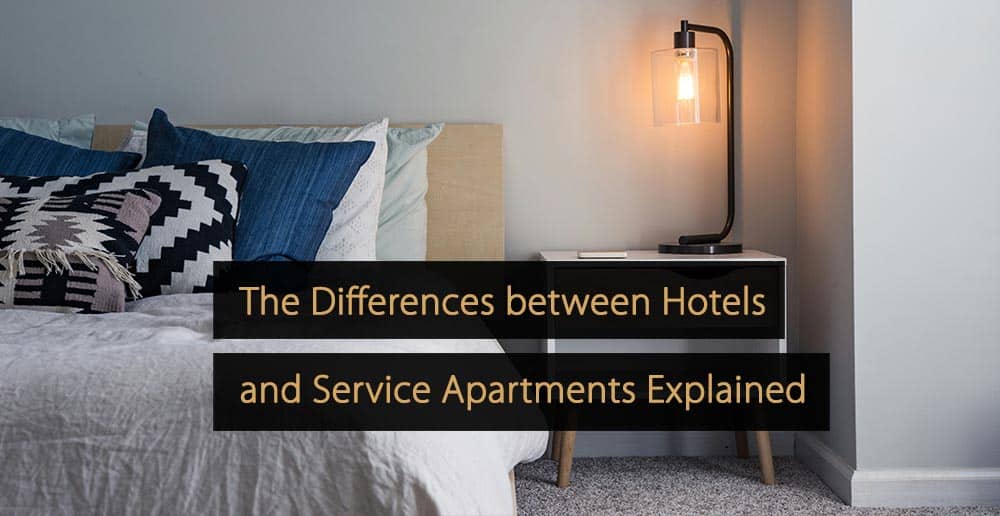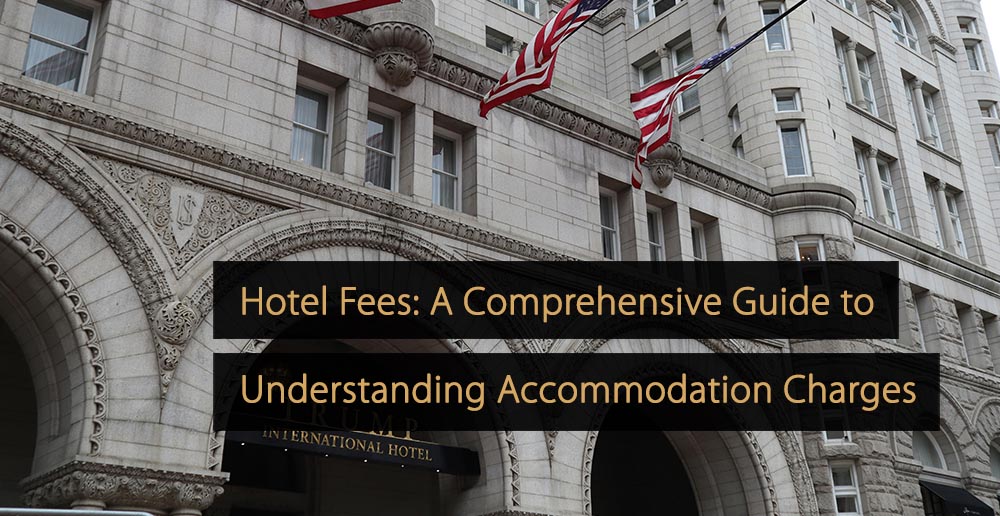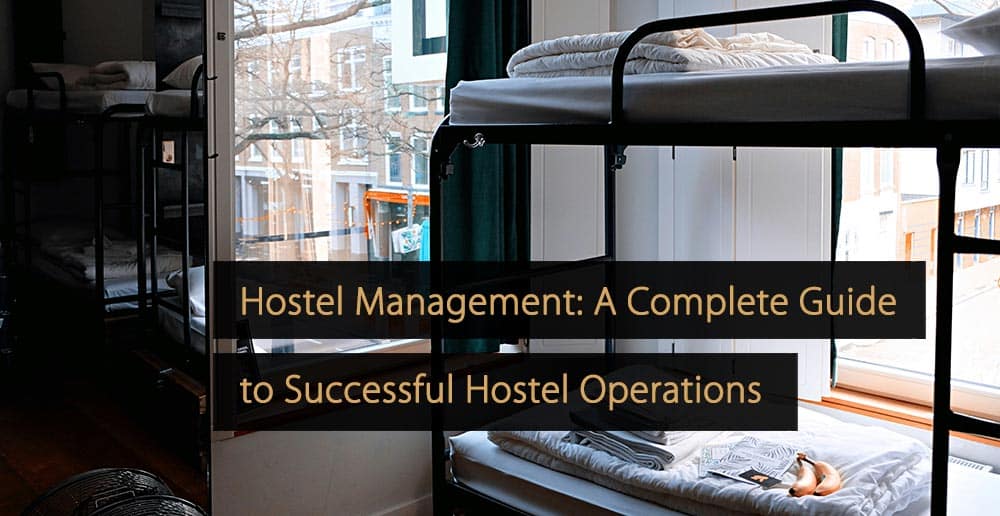What is the difference between hotel and service apartment properties? These two types of lodging are similar but still quite distinct from each other, to the point where they deserve some extra attention. The difference between a service apartment and a hotel is important for both hoteliers and guests alike as it sets goals and expectations. You know what to expect when the distinctions are plainly laid out.
In this article, you’ll learn exactly what differentiates the two. This will enable you to perfectly plan for your needs.
Table of Contents:
- What Is a Service Apartment?
- What Is a Hotel?
- How Do You Choose between a Serviced Apartment and a Hotel?
- 10 Differences Between Hotel and Service Apartment
- The Size of the Facilities
- The Provided Amenities
- Cost Differences between Options
- The Extent of Each Option’s Privacy
- The Subjective Elements of the Stay
- Furniture and Equipment Found in Each
- The Level of Service Each Provides
- The Kitchen or Lack of Such
- Options for Group Bookings
- The Typical Locations
- An Industry With Many Types of Lodging
- The Different Forms of Accommodation
What Is a Service Apartment?
Simply put, a service apartment is a lodging that combines the privacy of an apartment with the services you’d expect from a hotel. It’s an especially important option for people looking for their home’s comfort.
Understanding the difference between hotel and service apartment lodging is largely about understanding the focus of a service apartment. You’ll usually find amenities like housekeepers, concierge, and, of course, security. But on the home side of things, there are bedrooms, kitchenettes, living room options, and more.
This blend of hotel amenities with the comfort of home makes it an especially compelling option for people opting for extended stays. For example, it’s an ideal match for someone on a longer business trip. This can also be a huge financial benefit from both the hotelier’s and guest’s perspective. Money can be channeled differently for service apartments to meet different needs.
What Is a Hotel?
The flip side of asking about the difference between hotel and service apartment properties might seem fairly simple. But that’s not really the case. Hotel trends have created an immense level of specialization and differentiation within the industry. Most people are familiar with the more traditional form of hotel and assume that it represents the industry as a whole. But hostels, bed and breakfasts, and specialized boutique experiences can all qualify.
In the article “Hotel Meaning: Learn About All the Various Hotel Types” you’ll discover even more about the definition and nature of hotels.
How Do You Choose between a Serviced Apartment and a Hotel?
Choosing between a service apartment and a hotel is especially important as it sets the tone for your stay. The difference between hotel and service apartment properties is largely down to a difference in your experience. It’s largely subjective, as most factors come down to what you personally prefer. Take cooking, for example. Some people hate cooking and enjoy going out to eat or having room service bring new meals. Others miss the chance to cook their favorites when they’re traveling. This concept holds with most things.
Service apartments are generally best when you want to handle things on your own. It’s not just about relaxation either. Being able to have more autonomy in a service apartment also means that you can more easily set up work environments and home offices. Everything largely comes down to unique needs.
10 Differences Between Hotel and Service Apartment
The difference between hotel and service apartment options is considerable. However, there are ten main differentiating factors.
Video: Hotel Vs Serviced Apartments l Facilities at Serviced Apartments
1. The Size of the Facilities
Size makes a big difference between hotel and service apartment properties due to how they’re used. This generally refers to the option’s overall usable space. It’s important as options like bathrooms, kitchens, storage space, and rooms define how you’ll leverage the facilities. For example, being able to cook your meals. The service apartments generally give you the most amount of space and the freedom to make full use of it. However, at the same time, you’re also going to need to take care of those spaces more than you would with hotel rooms.
2. The Provided Amenities
Amenities often define the difference between hotel and service apartment facilities as they are a source of leisure. These include pools, bars, dining, and more. Amenities are important as they often define what hotel technology options and services you can count on. Airport transfers, spas, and more are hotel-focused. You’ll also often find that packaged deals are most commonly found with hotels. However, the benefit of service apartments is that the amenities provided will be focused more on the individual guest’s use than on communal usage. Again, apartments are usually more self-sustaining.
3. Cost Differences between Options
Another significant difference between hotel and service apartment options comes from the total cost. Despite being larger, a service apartment option is generally more affordable. This is especially important for extended stays where costs can quickly ramp up. Meanwhile, hotel management saves money through a guest’s more self-sufficient lodging choice. Prices will obviously vary by individual facility. However, in general, a service apartment will be around 30% to 50% less expensive. And different regions might even allow for more savings. For example, you might receive tax benefits by staying within a managed apartment property.
4. The Extent of Each Option’s Privacy
Privacy in the context of the difference between hotel and service apartment options refers to alone time. How easily can you retreat from the world? While privacy is important for everyone, it’s especially significant for business travelers. You might need to set up a home office or discuss private business. Hotels are usually the less private option as housekeeping and various other services will intersect with your stay. Meanwhile, you can generally set up a service apartment option in almost the same way that you would a traditional room in a standard apartment.
5. The Subjective Elements of the Stay
The difference between a hotel and a service apartment often comes down to how you want to spend time. For example, if you don’t want chores. This is especially important for longer stays where extra effort can become more significant. Laundry, chores, and more become more of an issue over time. Hotels generally take care of all of your daily chores for you. While in a service apartment, you’ll typically need to do the cooking, laundry, and other such chores on your own. However, this can also make it feel more like home.
6. Furniture and Equipment Found in Each
The furniture is another important difference between hotel and service apartment options. Hotels tend to be more utilitarian in terms of furniture when compared to apartments. Facilities branded more as cool hotels will often have additional elaborate furniture. However, you’ll typically only find chairs, beds, and desks in the average hotel. Meanwhile, a service apartment typically has everything you’d find at home. For example, you might find a washing machine, larger desks, chairs geared to work, and more. Again, this typically has a lot to do with service apartments focussing on longer stays.
Video: What’s included in a London Serviced Apartment
7. The Level of Service Each Provides
When discussing the difference between hotel and service apartment options, service refers to hotel services like cleaning and valet. Hotels tend to provide much more. In contrast, service apartments offer fewer services, but that also translates into a greater level of autonomy. Which is better is dependent on your preferences. For example, some people prefer to handle cooking and cleaning for themselves and will genuinely enjoy that part of service apartments. However, some service apartments do offer subsets of the services provided by hotels, even if they are at a smaller scale.
8. The Kitchen or Lack of Such
When discussing the difference between hotel and service apartment properties, the kitchen is where you’ll prepare food. However, this likewise includes a hotel’s smaller kitchenettes. A hotel might also offer a small minibar as part of the kitchenette. It’s an important consideration given how significant food is to your comfort. Hotels generally only have a microwave and minibar. Meanwhile, a service apartment will usually have the same level of kitchen you’d find at home. It might be smaller, but you’ll still have ovens, a fridge, and other elements essential to cooking meals.
9. Options for Group Bookings
Options for group booking, when discussing the difference between hotel and service apartment options, refer to your group management. It’s for people traveling in groups. It’s especially important as it can be hard to share space with others. Hotels generally offer smaller spaces in comparison to the service apartment options. Apartments have the downside of groups needing to chip in for chores. However, in general, it allows for even greater savings as the group can more easily split the already lowered cost of the stay. The apartment is generally more homey for group travelers.
10. The Typical Locations
Location is a somewhat hidden variable when discussing the difference between hotel and service apartment options. Generally, hotels are closer to tourist and business hubs. You need to decide how significant proximity to various locations will be when considering the options. Especially if you’re making frequent trips to specific locations. In contrast to hotels, service apartments are typically found in areas where you’d find standard apartments. So, there is less in tourist areas but more in residential or urban settings. While you might miss the tourist or business locations, it’s close to a location’s real cultural heart.
An Industry With Many Types of Lodging
The difference between hotel and service apartment options is significant. However, that’s hardly unique to those types. You’ll find that the industry as a whole has an incredible level of specialization and differentiation. A modern smart hotel, hostel, and boutique resort are all part of the larger lodging industry. Even something as eclectic as a houseboat or floatel qualifies under that larger banner of the lodging industry. The exploration is part of the fun.
You can discover all of the amazing options in the article “Lodging Industry Guide: All You Need to Know!“.
The Different Forms of Accommodation
In examining the difference between hotel and service apartment properties you’ve seen the scope of the hotel industry. However, the industry can be most easily discussed within the scope of eleven main categories. Each has its own subcategories. And the variety within any category can be shocking when first encountered. For example, the largest and smallest B&B will be quite distinct while still falling within the bed and breakfast category.
You can get a detailed overview of the most important forms of industry accommodation in the article “Types of Accommodation in the Hotel Industry“.
The difference between hotel and service apartment options is complex. However, the options for hotel facilities ensure that you now have the tools to create the perfect hotel experience to fit your needs.
More Tips to Grow Your Business
Revfine.com is the leading knowledge platform for the hospitality and travel industry. Professionals use our insights, strategies, and actionable tips to get inspired, optimize revenue, innovate processes, and improve customer experience.Explore expert advice on management, marketing, revenue management, operations, software, and technology in our dedicated Hotel, Hospitality, and Travel & Tourism categories.
This article is written by:
Hi, I am Martijn Barten, founder of Revfine.com. With 20 years of experience in the hospitality industry, I specialize in optimizing revenue by combining revenue management with marketing strategies. I have successfully developed, implemented, and managed revenue management and marketing strategies for individual properties and multi-property portfolios.










Leave A Comment